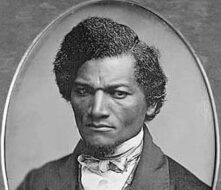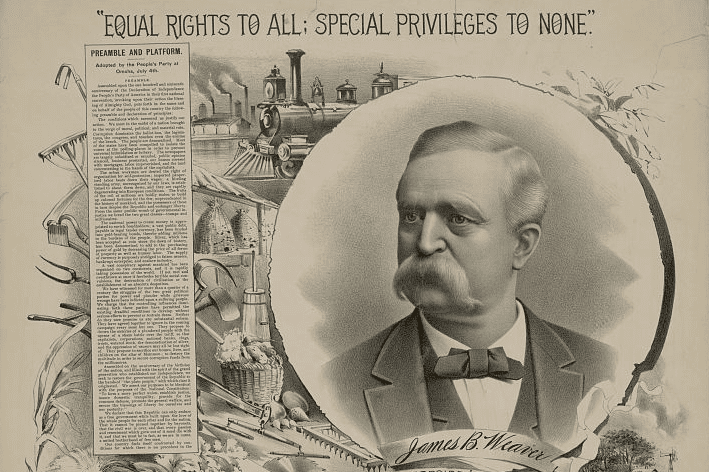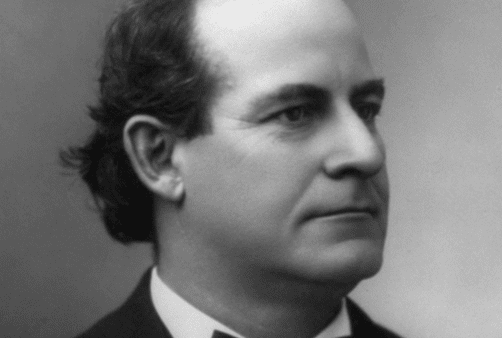


No related resources
Introduction
In 1912, Theodore Roosevelt lost the Republican Party’s presidential nomination to William Howard Taft (see “The New Nationalism” and “The Right of the People to Rule”). Roosevelt broke from the party to form the “Bull Moose” Progressive Party. In August, the new party held its national convention in Chicago to nominate Roosevelt and to create its platform. Titled “A Contract with the People,” the platform, excerpted below, advocated numerous progressive policies and embraced the major planks of Roosevelt’s New Nationalism (see “The Right of the People to Rule”). The party sought to give the people more direct power over all levels of government in order for government to regulate business and, among other things, provide labor and industrial reforms, social insurance, inheritance taxes, and farm relief. Roosevelt won more than 27 percent of the national popular vote and eighty-eight electoral votes in 1912. No third party had ever been so successful in a U.S. presidential election. Although Roosevelt lost the election to Woodrow Wilson and the Progressive Party disappeared, many of the proposals in its platform were implemented in subsequent years.
Source: George Henry Payne, The Birth of the New Party or Progressive Democracy (Atlanta: J. L. Nichols, 1912), 303–52, available online by Gerhard Peters and John T. Woolley, The American Presidency Project, https://www.presidency.ucsb.edu/node/273288.
The conscience of the people, in a time of grave national problems, has called into being a new party, born of the nation’s sense of justice. We of the Progressive Party here dedicate ourselves to the fulfillment of the duty laid upon us by our fathers to maintain the government of the people, by the people, and for the people whose foundations they laid.[1]
We hold with Thomas Jefferson and Abraham Lincoln that the people are the masters of their Constitution, to fulfill its purposes and to safeguard it from those who, by perversion of its intent, would convert it into an instrument of injustice. In accordance with the needs of each generation the people must use their sovereign powers to establish and maintain equal opportunity and industrial justice, to secure which this government was founded and without which no republic can endure.
This country belongs to the people who inhabit it. Its resources, its business, its institutions, and its laws should be utilized, maintained, or altered in whatever manner will best promote the general interest.
It is time to set the public welfare in the first place.
The Old Parties
Political parties exist to secure responsible government and to execute the will of the people.
From these great tasks both of the old parties have turned aside. Instead of instruments to promote the general welfare, they have become the tools of corrupt interests which use them impartially to serve their selfish purposes. Behind the ostensible government sits enthroned an invisible government owing no allegiance and acknowledging no responsibility to the people.
To destroy this invisible government, to dissolve the unholy alliance between corrupt business and corrupt politics is the first task of the statesmanship of the day.
The deliberate betrayal of its trust by the Republican Party, the fatal incapacity of the Democratic Party to deal with the new issues of the new time, have compelled the people to forge a new instrument of government through which to give effect to their will in laws and institutions.
Unhampered by tradition, uncorrupted by power, undismayed by the magnitude of the task, the new party offers itself as the instrument of the people to sweep away old abuses, to build a new and nobler commonwealth.
A Covenant with the People
This declaration is our covenant with the people, and we hereby bind the party and its candidates in state and nation to the pledges made herein.
The Rule of the People
The National Progressive Party, committed to the principles of government by a self-controlled democracy expressing its will through representatives of the people, pledges itself to secure such alterations in the fundamental law of the several states and of the United States as shall insure the representative character of the government.
In particular, the party declares for direct primaries for the nomination of state and national officers, for nationwide preferential primaries for candidates for the presidency; for the direct election of U.S. senators by the people; and we urge on the states the policy of the short ballot, with responsibility to the people secured by the initiative, referendum, and recall.
Amendment of Constitution
The Progressive Party, believing that a free people should have the power from time to time to amend their fundamental law so as to adapt it progressively to the changing needs of the people, pledges itself to provide a more easy and expeditious method of amending the federal Constitution.
Nation and State
Up to the limit of the Constitution, and later by amendment of the Constitution, if found necessary, we advocate bringing under effective national jurisdiction those problems which have expanded beyond reach of the individual states.
It is as grotesque as it is intolerable that the several states should by unequal laws in matter of common concern become competing commercial agencies, barter the lives of their children, the health of their women, and the safety and well-being of their working-people for the benefit of their financial interests.
The extreme insistence on states’ rights by the Democratic Party in the Baltimore platform demonstrates anew its inability to understand the world into which it has survived or to administer the affairs of a union of states which have in all essential respects become one people.
Equal Suffrage
The Progressive Party, believing that no people can justly claim to be a true democracy which denies political rights on account of sex, pledges itself to the task of securing equal suffrage to men and women alike.
Corrupt Practices
We pledge our party to legislation that will compel strict limitation of all campaign contributions and expenditures, and detailed publicity of both before as well as after primaries and elections.
Publicity and Public Service
We pledge our party to legislation compelling the registration of lobbyists; publicity of committee hearings except on foreign affairs, and recording of all votes in committee; and forbidding federal appointees from holding office in state or national political organizations, or taking part as officers or delegates in political conventions for the nomination of elective state or national officials.
The Courts
The Progressive Party demands such restriction of the power of the courts as shall leave to the people the ultimate authority to determine fundamental questions of social welfare and public policy. To secure this end, it pledges itself to provide:
- That when an act, passed under the police power of the state, is held unconstitutional under the state constitution, by the courts, the people, after an ample interval for deliberation, shall have an opportunity to vote on the question whether they desire the act to become law, notwithstanding such decision.
- That every decision of the highest appellate court of a state declaring an act of the legislature unconstitutional on the ground of its violation of the federal Constitution shall be subject to the same review by the Supreme Court of the United States as is now accorded to decisions sustaining such legislation. . . .
Social and Industrial Justice
The supreme duty of the nation is the conservation of human resources through an enlightened measure of social and industrial justice. We pledge ourselves to work unceasingly in state and nation for:
Effective legislation looking to the prevention of industrial accidents, occupational diseases, overwork, involuntary unemployment, and other injurious effects incident to modern industry;
The fixing of minimum safety and health standards for the various occupations, and the exercise of the public authority of state and nation, including the federal control over interstate commerce, and the taxing power, to maintain such standards;
The prohibition of child labor;
Minimum wage standards for working women, to provide a “living wage” in all industrial occupations;
The general prohibition of night work for women and the establishment of an eight-hour day for women and young persons;
One day’s rest in seven for all wage-workers;
The eight-hour day in continuous twenty-four-hour industries;
The abolition of the convict contract labor system; substituting a system of prison production for governmental consumption only; and the application of prisoners’ earnings to the support of their dependent families;
Publicity as to wages, hours, and conditions of labor; full reports upon industrial accidents and diseases, and the opening to public inspection of all tallies, weights, measures, and check systems on labor products;
Standards of compensation for death by industrial accident and injury and trade disease which will transfer the burden of lost earnings from the families of working-people to the industry, and thus to the community;
The protection of home life against the hazards of sickness, irregular employment, and old age through the adoption of a system of social insurance adapted to American use;
The development of the creative labor power of America by lifting the last load of illiteracy from American youth and establishing continuation schools for industrial education under public control and encouraging agricultural education and demonstration in rural schools;
The establishment of industrial research laboratories to put the methods and discoveries of science at the service of American producers;
We favor the organization of the workers, men and women, as a means of protecting their interests and of promoting their progress.
Department of Labor
We pledge our party to establish a department of labor with a seat in the cabinet, and with wide jurisdiction over matters affecting the conditions of labor and living.
Country Life
The development and prosperity of country life are as important to the people who live in the cities as they are to the farmers. Increase of prosperity on the farm will favorably affect the cost of living, and promote the interests of all who dwell in the country, and all who depend upon its products for clothing, shelter, and food.
We pledge our party to foster the development of agricultural credit and cooperation, the teaching of agriculture in schools, agricultural college extension, the use of mechanical power on the farm, and to reestablish the Country Life Commission, thus directly promoting the welfare of the farmers, and bringing the benefits of better farming, better business, and better living within their reach.[2] . . .
Business
We believe that true popular government, justice, and prosperity go hand in hand, and, so believing, it is our purpose to secure that large measure of general prosperity which is the fruit of legitimate and honest business, fostered by equal justice and by sound progressive laws.
We demand that the test of true prosperity shall be the benefits conferred thereby on all the citizens, not confined to individuals or classes, and that the test of corporate efficiency shall be the ability better to serve the public; that those who profit by control of business affairs shall justify that profit and that control by sharing with the public the fruits thereof.
We therefore demand a strong national regulation of interstate corporations. The corporation is an essential part of modern business. The concentration of modern business, in some degree, is both inevitable and necessary for national and international business efficiency. But the existing concentration of vast wealth under a corporate system, unguarded and uncontrolled by the nation, has placed in the hands of a few men enormous, secret, irresponsible power over the daily life of the citizen—a power insufferable in a free government and certain of abuse.
This power has been abused, in monopoly of national resources, in stock watering,[3] in unfair competition and unfair privileges, and finally in sinister influences on the public agencies of state and nation. We do not fear commercial power, but we insist that it shall be exercised openly, under publicity, supervision, and regulation of the most efficient sort, which will preserve its good while eradicating and preventing its ill.
To that end we urge the establishment of a strong federal administrative commission of high standing, which shall maintain permanent active supervision over industrial corporations engaged in interstate commerce, or such of them as are of public importance, doing for them what the government now does for the national banks, and what is now done for the railroads by the Interstate Commerce Commission.[4]
Such a commission must enforce the complete publicity of those corporation transactions which are of public interest; must attack unfair competition, false capitalization, and special privilege, and by continuous trained watchfulness guard and keep open equally all the highways of American commerce.
Thus the businessman will have certain knowledge of the law, and will be able to conduct his business easily in conformity therewith; the investor will find security for his capital; dividends will be rendered more certain, and the savings of the people will be drawn naturally and safely into the channels of trade.
Under such a system of constructive regulation, legitimate business, freed from confusion, uncertainty, and fruitless litigation, will develop normally in response to the energy and enterprise of the American businessman.
We favor strengthening the Sherman Law by prohibiting agreement to divide territory or limit output; refusing to sell to customers who buy from business rivals; to sell below cost in certain areas while maintaining higher prices in other places; using the power of transportation to aid or injure special business concerns; and other unfair trade practices.[5] . . .
Commercial Development
The time has come when the federal government should cooperate with manufacturers and producers in extending our foreign commerce. To this end we demand adequate appropriations by Congress, and the appointment of diplomatic and consular officers solely with a view to their special fitness and worth, and not in consideration of political expediency.
It is imperative to the welfare of our people that we enlarge and extend our foreign commerce.
In every way possible our federal government should cooperate in this important matter. Germany’s policy of cooperation between government and business has, in comparatively few years, made that nation a leading competitor for the commerce of the world.
Conservation
The natural resources of the nation must be promptly developed and generously used to supply the people’s needs, but we cannot safely allow them to be wasted, exploited, monopolized, or controlled against the general good. We heartily favor the policy of conservation, and we pledge our party to protect the national forests without hindering their legitimate use for the benefit of all the people.
Agricultural lands in the national forests are, and should remain, open to the genuine settler. Conservation will not retard legitimate development. The honest settler must receive his patent promptly, without hindrance, rules, or delays.
We believe that the remaining forests, coal and oil lands, water powers, and other natural resources still in state or national control (except agricultural lands) are more likely to be wisely conserved and utilized for the general welfare if held in the public hands.
In order that consumers and producers, managers and workmen, now and hereafter, need not pay toll to private monopolies of power and raw material, we demand that such resources shall be retained by the state or nation, and opened to immediate use under laws which will encourage development and make to the people a moderate return for benefits conferred.
In particular we pledge our party to require reasonable compensation to the public for water-power rights hereafter granted by the public.
We pledge legislation to lease the public grazing lands under equitable provisions now pending which will increase the production of food for the people and thoroughly safeguard the rights of the actual homemaker. Natural resources, whose conservation is necessary for the national welfare, should be owned or controlled by the nation. . . .
Alaska
The coal and other natural resources of Alaska should be opened to development at once. They are owned by the people of the United States, and are safe from monopoly, waste, or destruction only while so owned.
We demand that they shall neither be sold nor given away, except under the Homestead Law,[6] but while held in government ownership shall be opened to use promptly upon liberal terms requiring immediate development.
Thus the benefit of cheap fuel will accrue to the government of the United States and to the people of Alaska and the Pacific Coast; the settlement of extensive agricultural lands will be hastened; the extermination of the salmon will be prevented; and the just and wise development of Alaskan resources will take the place of private extortion or monopoly.
We demand also that extortion or monopoly in transportation shall be prevented by the prompt acquisition, construction, or improvement by the government of such railroads, harbor, and other facilities for transportation as the welfare of the people may demand.
We promise the people of the Territory of Alaska the same measure of legal self-government that was given to other American territories, and that federal officials appointed there shall be qualified by previous bona-fide residence in the territory. . . .
Panama Canal
The Panama Canal, built and paid for by the American people, must be used primarily for their benefit.
We demand that the canal shall be so operated as to break the transportation monopoly now held and misused by the transcontinental railroads by maintaining sea competition with them; that ships directly or indirectly owned or controlled by American railroad corporations shall not be permitted to use the canal, and that American ships engaged in coastwise trade shall pay no tolls.
The Progressive Party will favor legislation having for its aim the development of friendship and commerce between the United States and Latin American nations.
Tariff
We believe in a protective tariff which shall equalize conditions of competition between the United States and foreign countries, both for the farmer and the manufacturer, and which shall maintain for labor an adequate standard of living.
Primarily the benefit of any tariff should be disclosed in the pay envelope of the laborer. We declare that no industry deserves protection which is unfair to labor or which is operating in violation of federal law. We believe that the presumption is always in favor of the consuming public.
We demand tariff revision because the present tariff is unjust to the people of the United States. Fair dealing toward the people requires an immediate downward revision of those schedules wherein duties are shown to be unjust or excessive. . . .
We condemn the Payne-Aldrich bill as unjust to the people.[7] The Republican organization is in the hands of those who have broken, and cannot again be trusted to keep, the promise of necessary downward revision.
The Democratic Party is committed to the destruction of the protective system through a tariff for revenue only, a policy which would inevitably produce widespread industrial and commercial disaster. . . .
Inheritance and Income Tax
We believe in a graduated inheritance tax as a national means of equalizing the obligations of holders of property to government, and we hereby pledge our party to enact such a federal law as will tax large inheritances, returning to the states an equitable percentage of all amounts collected.
We favor the ratification of the pending amendment to the Constitution giving the government power to levy an income tax.
Peace and National Defense
The Progressive Party deplores the survival in our civilization of the barbaric system of warfare among nations with its enormous waste of resources even in time of peace, and the consequent impoverishment of the life of the toiling masses. We pledge the party to use its best endeavors to substitute judicial and other peaceful means of settling international differences.
We favor an international agreement for the limitation of naval forces. Pending such an agreement, and as the best means of preserving peace, we pledge ourselves to maintain for the present the policy of building two battleships a year. . . .
The Immigrant
Through the establishment of industrial standards we propose to secure to the able-bodied immigrant and to his native fellow workers a larger share of American opportunity.
We denounce the fatal policy of indifference and neglect which has left our enormous immigrant population to become the prey of chance and cupidity.
We favor governmental action to encourage the distribution of immigrants away from the congested cities, to rigidly supervise all private agencies dealing with them and to promote their assimilation, education, and advancement. . . .
Civil Service
We condemn the violations of the Civil Service Law under the present administration, including the coercion and assessment of subordinate employees, and the president’s refusal to punish such violation after a finding of guilty by his own commission; his distribution of patronage among subservient congressmen while withholding it from those who refuse support of administration measures; his withdrawal of nominations from the Senate until political support for himself was secured, and his open use of the offices to reward those who voted for his renomination.[8]
To eradicate these abuses, we demand not only the enforcement of the Civil Service Act in letter and spirit, but also legislation which will bring under the competitive system postmasters, collectors, marshals, and all other nonpolitical officers, as well as the enactment of an equitable retirement law, and we also insist upon continuous service during good behavior and efficiency.
Government Business Organization
We pledge our party to readjustment of the business methods of the national government and a proper coordination of the federal bureaus, which will increase the economy and efficiency of the government service, prevent duplications, and secure better results to the taxpayers for every dollar expended.
Government Supervision Over Investments
The people of the United States are swindled out of many millions of dollars every year, through worthless investments. The plain people, the wage-earner and the men and women with small savings, have no way of knowing the merit of concerns sending out highly colored prospectuses offering stock for sale, prospectuses that make big returns seem certain and fortunes easily within grasp.
We hold it to be the duty of the government to protect its people from this kind of piracy. We, therefore, demand wise, carefully thought out legislation that will give us such governmental supervision over this matter as will furnish to the people of the United States this much-needed protection, and we pledge ourselves thereto.
Conclusion
On these principles and on the recognized desirability of uniting the progressive forces of the nation into an organization which shall unequivocally represent the progressive spirit and policy we appeal for the support of all American citizens, without regard to previous political affiliations.
- 1. The platform quotes Lincoln’s Gettysburg Address.
- 2. The Country Life Commission was created by Theodore Roosevelt in 1908 to investigate and propose remedies to some of the challenges of rural living.
- 3. “Stock watering” refers to the issuing of stock that has an inflated value, typically to defraud investors.
- 4. Created in 1887, during the first Cleveland administration, the Interstate Commerce Commission (ICC) was an independent federal regulatory agency meant to regulate telephone companies, railroads (particularly railroad shipping rates), and other interstate modes of transportation. The ICC was replaced by the Surface Transportation Board in 1996.
- 5. Passed in 1890, the Sherman Antitrust Act was meant to outlaw monopolistic business practices affecting interstate commerce. The act, many argued, was vaguely worded and its ends and means underspecified. Many progressives sought additional legislation to give real teeth to the Sherman Act. Some of those concerns would be addressed in the Clayton Antitrust Act, passed in 1914, during the Wilson administration.
- 6. In order to support westward expansion, Congress passed the Homestead Act in 1862. Under the legislation, an individual could claim up to 160 acres of government land, provided the individual paid a filing fee, worked that land, and applied for a deed.
- 7. Passed with the support of President Taft, the Payne-Aldrich Tariff Act of 1909 was intended to lower tariff rates, but not to the degree that progressives demanded. The tariff issue helped to split the Republican Party into its progressive and conservative wings in 1912, with many on the conservative wing arguing for high protective tariffs and progressives arguing for lower tariff rates. Rates were lowered from 40 percent to 26 percent in the Wilson administration via the Underwood Tariff Act of 1913.
- 8. The 1883 Pendleton Civil Service Act required that federal employment be awarded on the basis of merit and civil service exams rather than “spoils,” or political patronage.
Open Letters to Woodrow Wilson
March 31, 1913
Conversation-based seminars for collegial PD, one-day and multi-day seminars, graduate credit seminars (MA degree), online and in-person.


































































































